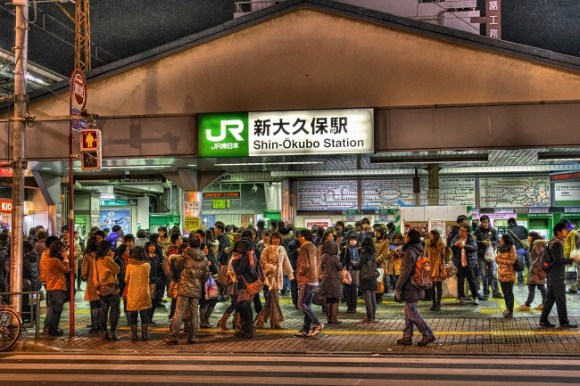
If you are looking for some Korean food while in Tokyo, the place to go is Shin-Okubo. The famed “Korea Town” in the middle of the metropolitan Tokyo area has served as a gathering place for fans of Korean TV dramas, K-pop music and Korean cuisine. Sadly, though, what was once was a bustling consumer zone for people who loved all things Korean, though, has seen its fortunes decline in recent years, and there are a number of theories as to why.
Back in the early 2000s, many Japanese TV viewers loved Korean dramas. These gripping shows captivated audiences and helped fuel the popularity of Korean products and food all over Japan. The 2002 FIFA World Cup that was shared by Korea and Japan really cemented a partnership in modern popular culture that largely ignored the historical issues between the two countries.
The craze was a real boon to the two Korea Towns in Japan: Osaka’s Tsuruhashi and Tokyo’s Shin-Okubo. These two areas saw a huge influx of Korean restaurants and businesses that relied on the popularity of Korea to drive their sales. However, presently the relationship between the two countries has soured quite a bit due to political stands taken by each country’s leaders. Many Japanese news outlets mention former President of South Korea Lee Myung-bak’s unexpected visit to Takeshima/Dokdo in 2012 as one of the catalysts for their poor views of the country. These islands are a constant reminder of the tension that exists between the two countries, as both claim sovereignty over them.
▼ Location of the Liancourt Rocks/Takeshima/Dokdo.
As a number of other events have continued to sour relations, both Korea Towns have been feeling the squeeze. Shin-Okubo in particular is seeing a dramatic drop in visitors and sales. Famous Korean restaurants like Taishikan and Ozakkyo have shuttered their doors, while some restaurants that are still open state that they have seen their business drop by 30 percent. Around 70 shops in the area have closed up, including the well-known Hankyu Department Store, which has been replaced by a duty-free store aimed at Chinese shoppers.
The great number of business closures in the area means ample opportunity for other enterprises to swoop in and capitalize on the familiar territory. Recently there have been many restaurants and grocery stores that cater to halal food in Shin-Okubo resulting in an area being labeled as Isuramu Yokocho (Islam Alley). However, that is the nature of commercial ventures, trends will rise and fall and it’s up to savvy entrepreneurs to stay on top of the current trends.
If you read about the declining businesses in Shin-Okubo, you may hear the rise of kenkan (a hatred of things Korean) as one the reasons. However, when this same information was reported to Korean Internet users, they offered some other theories for the decline.
“Really? Is the problem only kenkan? When people study abroad in Tokyo, they will understand. There was an issue of labor exploitation carried out by Shin-Okubo’s Korean managers. They will understand that the enemy of Koreans is other Koreans.”
“I live close to Shin-Okubo, but there aren’t many kenkan demonstrations here. The restaurants closed because they are expensive and not that delicious. This kenkan problem is just an excuse.”
“I live in Osaka, I’ve never been discriminated against just because I’m Korean. I have to be more careful of how I’m treated by other Koreans.”
These are widely differing opinions on the decline of Shin-Okubo, and perhaps the real reason lies somewhere in the middle. We can only hope that the continuing escalation of problems between the two nations can find a resolution and we can all go back to celebrating each other’s culture.
Source: Focus-Asia
Additional Information: TV Tokyo
Top Image: Flickr (jun560)